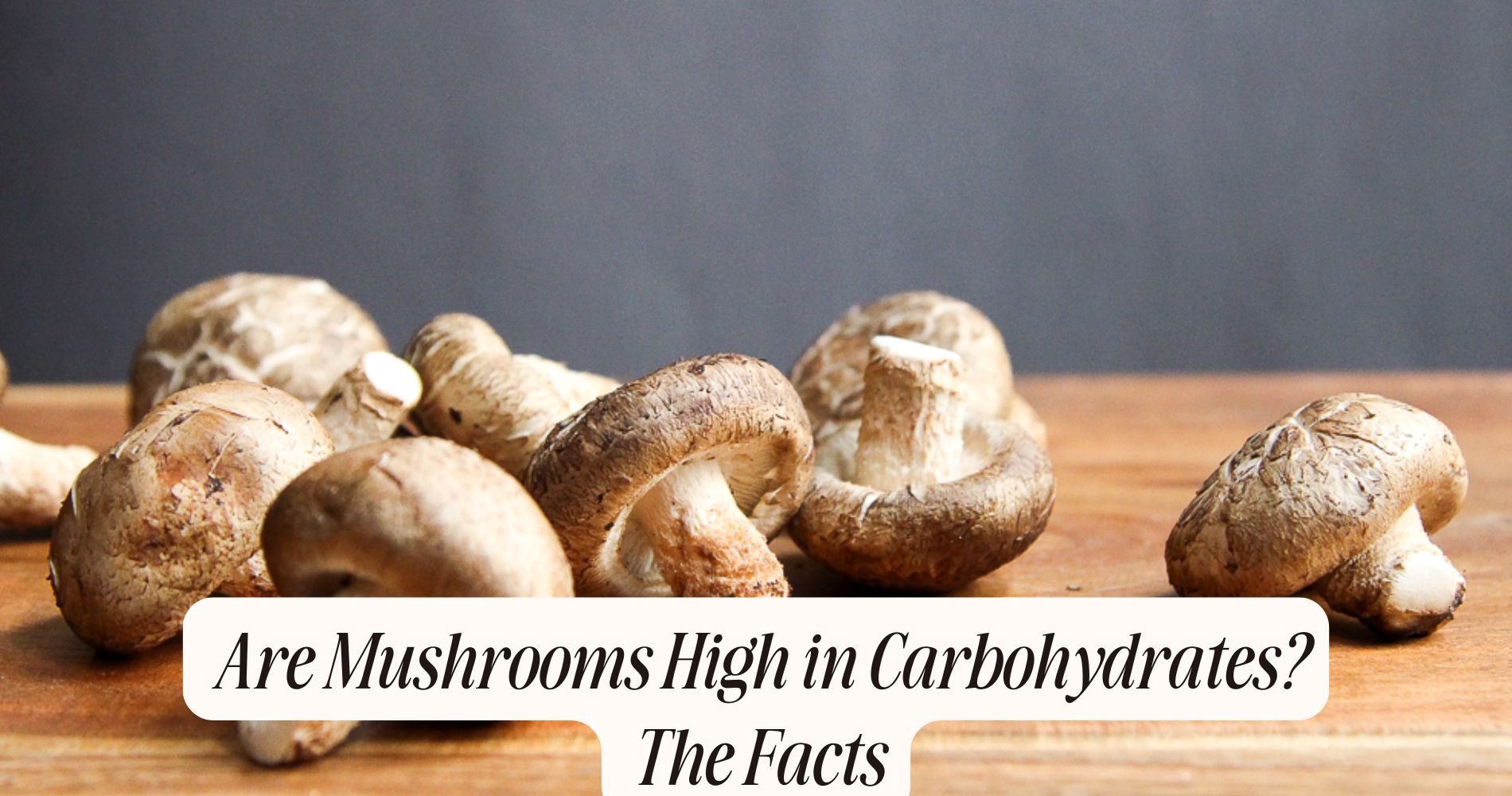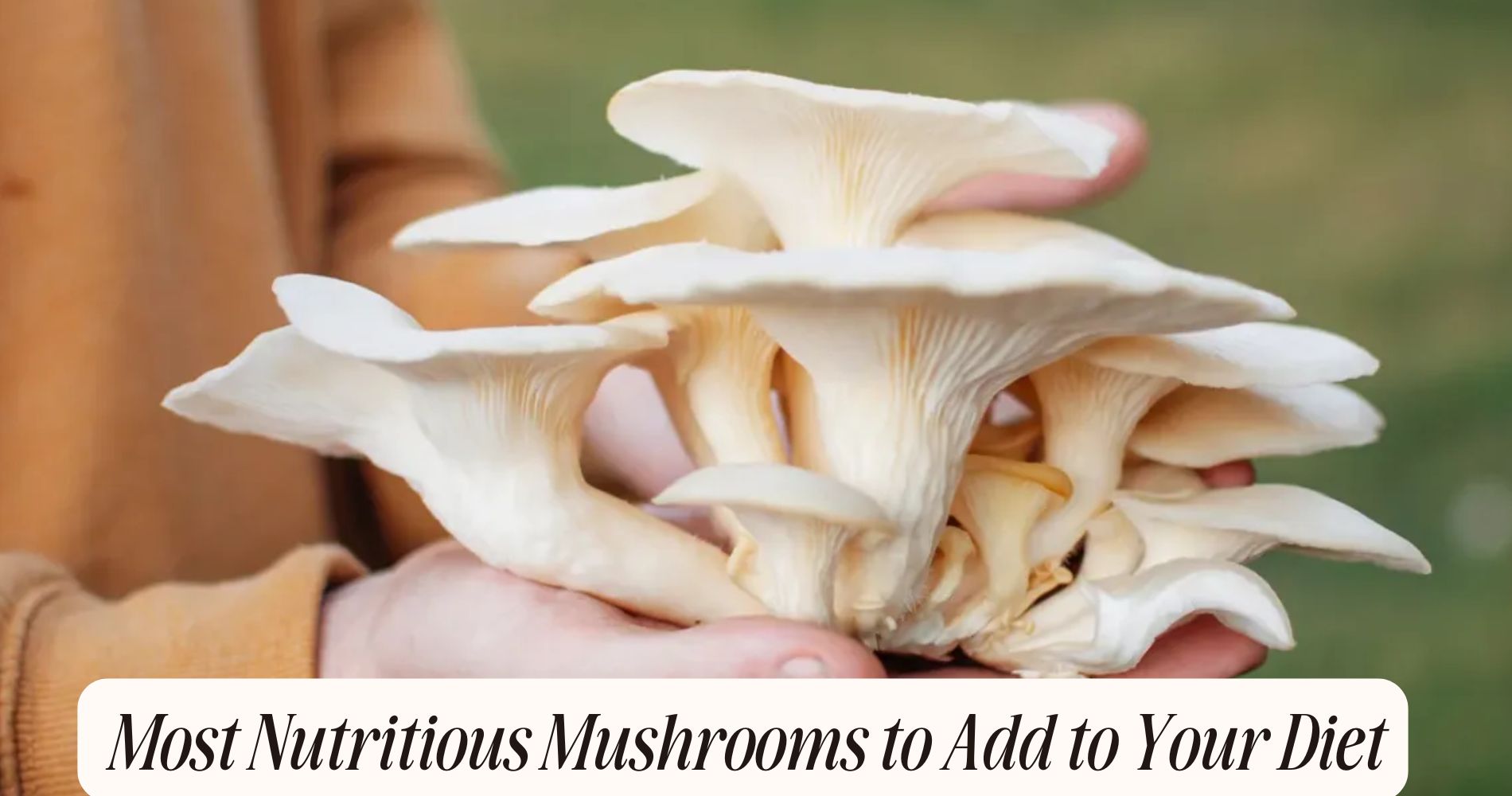
Are Mushrooms High in Carbohydrates? The Facts
Are mushrooms high in carbohydrates? Mushrooms are low in carbohydrates, with about 3-4 grams per 100 grams, primarily from dietary fiber that benefits digestion. For example, one cup of cooked white mushrooms contains just 2 grams of carbs, considerably less than starchy foods like pasta or potatoes. This low carbohydrate content makes mushrooms suitable for low-carb diets such as keto and paleo. Plus, they're packed with essential nutrients like B vitamins and antioxidants, adding to their health benefits. If you're curious about how to incorporate these versatile fungi into various meals, there's more to explore about their nutritional potential and culinary uses.
Nutritional Overview of Mushrooms
Mushrooms offer a fascinating blend of nutrients that can enhance your diet considerably. These versatile fungi come in various mushroom varieties, each with unique nutritional profiles and culinary uses.
For instance, shiitake mushrooms are rich in B vitamins and minerals like selenium, while portobello mushrooms provide fiber and antioxidants.
Incorporating mushrooms into your meals can boost your nutrient intake without adding excessive calories. They're low in fat and sodium, making them an excellent choice for heart-healthy diets.
Beyond vitamins and minerals, mushrooms also contain bioactive compounds that may support immune function and overall health.
You can explore countless culinary uses for mushrooms, from sautéing them in stir-fries to adding them to soups and salads. Their umami flavor can enhance the taste of various dishes, making them a popular meat substitute in vegetarian and vegan cuisine.
Carbohydrate Content Breakdown
Understanding the carbohydrate content in mushrooms is essential for evaluating their nutritional profile.
Different types of mushrooms offer varying amounts of carbohydrates, which can influence their health benefits.
Nutritional Profile Overview
Often overlooked, mushrooms offer a unique nutritional profile that includes a variety of carbohydrates. While they're low in calories, mushrooms contain approximately 3-4 grams of carbohydrates per 100 grams, depending on the mushroom varieties you choose. These carbohydrates primarily come from dietary fiber, which plays a vital role in digestive health.
In addition to fiber, mushrooms contain polysaccharides, such as beta-glucans, known for their immune-boosting properties. This carbohydrate component not only enhances their nutritional value but also contributes to the overall culinary uses of mushrooms. You can incorporate them into soups, stir-fries, or even salads, benefiting from their subtle flavors and textures.
Moreover, mushrooms are low in sugars, making them an excellent choice for those monitoring their carbohydrate intake. The nutritional profile of mushrooms varies slightly between varieties like shiitake, portobello, and button mushrooms, but the overall carbohydrate content remains relatively consistent.

Types of Mushrooms
When exploring the carbohydrate content of various mushroom types, you'll find notable differences that can influence your dietary choices. Edible varieties like button, shiitake, and portobello mushrooms typically contain low carbohydrates, making them suitable for low-carb diets.
Wild mushrooms, such as chanterelles and morels, also offer distinct flavor profiles and culinary uses, but their carbohydrate content may vary based on their growing conditions.
Nutritional myths often surround mushrooms, but many are low in calories and carbohydrates while being rich in fiber. For example, a cup of cooked shiitake mushrooms contains about 6 grams of carbohydrates.
Preservation methods, such as drying or canning, can alter this content, so it's crucial to check labels when purchasing.
When incorporating mushrooms into popular dishes like risottos, stir-fries, and soups, their seasonal availability can also affect freshness and flavor.
Certain mushrooms thrive in specific seasons, which can impact their taste and texture. Understanding these variations can help you make informed choices that align with your dietary needs while enjoying the diverse culinary options mushrooms offer.
Health Benefits Explored
Delving into the health benefits of mushrooms reveals that their low carbohydrate content can be a significant advantage for various dietary approaches. With mushroom varieties like shiitake, portobello, and button containing about 2-4 grams of carbohydrates per 100 grams, they're an excellent choice for those managing their carb intake. This low carbohydrate content means you can incorporate them into low-carb diets, such as ketogenic or paleo, without feeling guilty.
Moreover, the health advantages of mushrooms extend beyond just their carbohydrate profile. They're rich in nutrients like vitamins D and B, antioxidants, and fiber, which contribute to overall wellness. For instance, beta-glucans found in certain mushroom varieties may support immune function and promote heart health by helping to lower cholesterol.
Additionally, mushrooms provide a unique umami flavor, allowing you to enhance the taste of dishes while keeping calories and carbs in check. By including a variety of mushrooms in your meals, you not only enjoy diverse flavors but also reap their numerous health benefits.
To conclude, mushrooms can be a smart choice for those seeking nutritious, low-carb food options.
Types of Mushrooms Compared
Comparing different types of mushrooms reveals a fascinating variety of flavors, textures, and nutritional profiles that can greatly influence your culinary choices. Edible varieties like shiitake, portobello, and oyster mushrooms stand out for their unique flavor profiles and culinary uses, ranging from soups to stir-fries.

When foraging, it's essential to know harvesting tips, as some mushrooms have toxic species that can be dangerous.
Regional types vary widely, with each area offering distinct mushrooms that thrive in specific climates. Understanding their ecological roles helps in appreciating their environmental importance. For example, some mushrooms contribute to soil health and nutrient cycling.
Cultivation techniques also play a significant role in mushroom production. You might consider growing your own mushrooms at home, as this guarantees freshness and control over preservation methods, such as drying or freezing.
Additionally, certain mushrooms boast medicinal properties that enhance their appeal.
Health Benefits of Mushrooms
Exploring the diverse world of mushrooms not only enhances culinary experiences but also offers a wealth of health benefits. Different mushroom varieties, such as shiitake, reishi, and maitake, are packed with nutrients that can greatly boost your well-being.
For instance, they're rich in antioxidants, which combat oxidative stress and may lower the risk of chronic diseases.
One of the most compelling benefits of mushrooms is their ability to provide immune support. Research indicates that certain compounds found in mushrooms, like beta-glucans, enhance your immune response by activating immune cells. This means that incorporating a variety of mushrooms into your diet could help you fend off illnesses more effectively.
Additionally, mushrooms are low in calories yet high in vitamins and minerals, making them an ideal food choice for those looking to maintain a healthy weight without sacrificing nutrition.
They also contain essential nutrients like vitamin D and B vitamins, which play important roles in maintaining overall health.
Mushrooms in Low-Carb Diets
Incorporating mushrooms into low-carb diets can be a game-changer for those looking to manage their carbohydrate intake without sacrificing flavor or nutrition. With their low carbohydrate content—ranging from 1 to 3 grams per 100 grams—mushrooms are an excellent choice for anyone following a low-carb lifestyle.
Various mushroom varieties, such as portobello, shiitake, and cremini, not only provide diverse flavors but also boost the nutritional profile of your meals. They're rich in vitamins, minerals, and antioxidants while being low in calories. You can easily incorporate these mushrooms into low carb recipes, whether you're sautéing them as a side dish, adding them to salads, or using them as a meat substitute in tacos or burgers.

Additionally, mushrooms' unique umami flavor enhances dishes without the need for high-carb ingredients. By replacing traditional starches with mushrooms, you'll enjoy satisfying meals that keep your carbohydrate levels in check.
Other Foods vs. Mushrooms
When comparing mushrooms to other foods, it's crucial to look at their carbohydrate content, nutritional density, and overall health benefits.
You'll notice that mushrooms often have fewer carbs while providing a range of vitamins and minerals, making them a smart choice for health-conscious individuals.
Carbohydrate Comparison Chart
Many people might be surprised to learn how mushrooms stack up against other common foods regarding carbohydrate content. When you compare mushrooms to typical carbohydrate sources like bread, pasta, or rice, you'll notice a significant difference.
For instance, one cup of cooked white mushrooms contains about 2 grams of carbohydrates, while the same serving of cooked pasta can have around 37 grams. This stark contrast highlights the low carbohydrate nature of mushrooms, making them an excellent choice for those monitoring their dietary impact.
If you're looking to reduce carbohydrate intake, incorporating mushrooms into your meals can be a smart strategy. They not only add flavor but also provide a nutritious base in numerous dishes without the excess carbs.
In contrast, foods like potatoes or corn can carry around 30 grams of carbohydrates per cup, further solidifying mushrooms' status as a low-carb option. This comparison underscores the importance of selecting the right carbohydrate sources in your diet.
Nutritional Density Analysis
Mushrooms stand out not only for their low carbohydrate content but also for their impressive nutritional density compared to other foods. When you analyze various foods, mushrooms, particularly popular mushroom varieties like shiitake, portobello, and cremini, provide a wealth of vitamins and minerals with minimal calories.
For instance, a cup of sliced white mushrooms contains about 15 calories while offering potassium, selenium, and B vitamins, making them an excellent choice for enhancing your diet without adding excess carbs.
In contrast, many starchy foods, such as potatoes or rice, pack considerably more calories and carbohydrates per serving, often lacking the same level of micronutrients.
The cooking techniques you choose can also impact nutritional density; for example, sautéing mushrooms in a small amount of healthy oil can help retain their nutrients, while steaming may preserve even more.
Health Benefits Overview
A diverse range of foods offers various health benefits, yet mushrooms often emerge as a standout option due to their unique combination of nutrients and low calorie count. Unlike many starchy foods, mushrooms are low in carbohydrates while being rich in vitamins, minerals, and antioxidants.
For instance, varieties like shiitake and maitake not only enhance culinary uses but also contribute to immune support and cardiovascular health.

When compared to traditional carbohydrate-rich foods, mushrooms provide a wealth of nutrients with fewer calories. They contain beta-glucans, which can help regulate blood sugar levels and improve heart health.
Additionally, mushrooms are an excellent source of B vitamins, which promote energy metabolism and mental clarity—benefits often lacking in high-carb options.
Incorporating different mushroom varieties into your diet allows you to experiment with flavors while reaping these health benefits.
Whether you're sautéing portobellos, adding chanterelles to a risotto, or tossing oyster mushrooms into salads, you're making a nutritious choice.
Ultimately, mushrooms not only serve as a delicious ingredient but also provide a more health-conscious alternative to many carbohydrate-heavy foods.
Cooking Methods and Their Impact
Cooking methods play an essential role in determining the nutritional profile and flavor of mushrooms, particularly in relation to their carbohydrate content. When you use steaming methods, for instance, you preserve most of the mushrooms' nutrients, including their low carbohydrate levels. This technique minimizes the loss of soluble vitamins, making it an excellent choice for health-conscious cooking.
Sautéing effects can also enhance the flavor while slightly reducing carbohydrate content due to moisture evaporation.
Roasting benefits mushrooms by concentrating their natural sugars, which can lead to a richer taste but may slightly increase the perception of carbohydrates.
Grilling techniques introduce a smoky flavor, and while they can caramelize the sugars, they typically maintain the overall low carbohydrate profile.
In contrast, frying impacts mushrooms by adding fats, which can change their caloric density without notably altering carbohydrate levels.
Baking variations allow for versatile uses, often combined with other ingredients, which might affect the total carbohydrate content of the dish.
Understanding these cooking methods will empower you to choose the best technique for your dietary needs while maximizing the flavor and nutritional benefits of mushrooms.
Power Your Day with SUPER MUSHROOM GUMMIES
Curious about are mushrooms high in carbohydrates? With Well Gummies’ SUPER MUSHROOM GUMMIES, you can enjoy the benefits of 10 functional mushrooms without worrying about excess carbs. These easy-to-chew gummies fuel your brain, sharpen focus, and boost immune support—all in a delicious wild berry flavor. Designed to provide calm energy without jitters or crashes, they fit seamlessly into any wellness routine. Try them today for a tasty, low-carb way to enhance your health and vitality!
Frequently Asked Questions
Can Mushrooms Cause Allergic Reactions in Some Individuals?
Yes, mushrooms can cause allergic reactions in some individuals. If you experience allergic symptoms like itching, swelling, or difficulty breathing after consuming them, it is important to seek medical advice and consider testing for mushroom allergies.
Are There Any Mushrooms That Are Toxic or Poisonous?
Yes, some mushrooms are toxic and can be poisonous. You should avoid species like the Amanita phalloides or the Gyromitra esculenta, as they can cause severe health issues. Always identify mushrooms carefully before consumption.
How Should Mushrooms Be Stored for Maximum Freshness?
To keep mushrooms fresh, use proper storage methods. Place them in a paper bag in the fridge, avoiding airtight containers. For best results, consume within a week and follow these freshness tips for ideal flavor.
Do Mushrooms Have Any Impact on Gut Health?
Mushroom varieties can positively influence your gut microbiome. They contain prebiotics that feed beneficial bacteria, promoting a balanced gut environment. Including diverse mushrooms in your diet may enhance digestion and overall gut health considerably.
Can Mushrooms Be Grown at Home Easily?
Yes, you can grow mushrooms at home easily using home growing kits. These kits simplify mushroom cultivation techniques, allowing you to produce fresh mushrooms with minimal effort, ensuring a rewarding and delicious gardening experience.
Conclusion
To summarize, mushrooms are low in carbohydrates, making them an excellent choice for various diets. With their diverse types and health benefits, they can enhance your meals without greatly impacting your carb intake. When compared to other foods, mushrooms stand out for their nutritional value and versatility. By incorporating them into your cooking, you can enjoy their unique flavors and health advantages while keeping your carbohydrate consumption in check. So, don't hesitate to add mushrooms to your diet!




